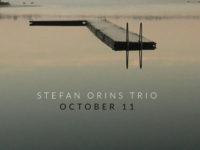The Philadelphia music scene has long been known for its vibrancy, eclecticism, and musical edge. Nearly two years ago, drummer and Philly native Marcus Myers suffered an accident that forced him to take a break from playing music and which brought about a period of hurt, deep reflection and maturation. During this time, Myers “composed through reflection” and now fast forward to the present, after having returned to his instrument, he has released October’s Fire, which presents a new concept and sound that has the potential to become the definition for the next generation of music that comes from Philadelphia and the East Coast.
Formed and led by Myers, Ode to Omni is an 11-piece musical collective that continually adds and interchanges instrumentation to suite its musical aims. It is impossible to label the collective with any single genre, and in fact, Ode to Omni cleverly destroys the very concept of genre by using it against itself. The group has clear roots in jazz improvisation, funk, soul, hip hop, and gospel, but transcends them by grasping the “omnipresent” element that is within all of them, and that which can only be truly understood by hearing the album in its entirety. Also important is the name of the ensemble, Ode to Omni, which indicates “devotion to omnipresence (God)” and serves as a backdrop to the carefully constructed poetic nature of the album.
Setting the stage for the album, “Amiss” begins with a repeated guitar phrase that is meditative and soon accompanied with a piano melody, the combination of which easily absorbs the listener into the flow of the album and prepares them for what is to come.
From the very first moment of “All I Have,” the urban Philly feel is transparent and brings the listener to any street corner of the city. Maricia Danielle’s powerful vocals brings the tune even more alive and the lyrics, “If self-Indulgence is a cancer, we’re slowly killing ourselves. Our hearts long for more, than the menial things we possess” … “We can never capture everything, they’re meant to pass away. And even if you try to hold on, your kingdom will fall” — is a foreshadowing of what is to come in later in the album. It’s one of those songs that you’ll place on repeat for hours on end — at home, in the car, at the gym, with friends — anywhere and everywhere.
“Fighting Through It” is a fifteen minute construction through various modes, tempos, and melodies that is highlighted by the musicianship of the instrumentalists through various improvisations. The song has a continuous flow from soft declarations that build to soaring peaks. The energy at these peaks, which continue throughout the album, is so vibrant that it seemingly jumps out off record. One can only imagine what the energy is like livev…
The next tracks are a three part movement that outlines the theme of the album. “Kneb Movement 1 (Arrogant Reign),” backed by a march-like drumbeat, begins with a statement and proclamation that portrays an air of confidence and conceit that slips into a hard hip-hop-like groove. “Kneb Movement 2 (Stripped),” lays out a melancholic mood that easily brings to mind the visualization of the dawn right after the destruction of a fallen kingdom when the devastation and flames of a city can be seen for the first time after the night’s battle. And finally, “Kneb Movement 3 (Restored Kingdom)” is a song of pure joy and celebration indicated by the restoration, and when the funk groove comes in half way through the track, it’s hard to keep yourself from dancing. Then, vocals return to the picture, announcing in the message of victory and the lesson learned: “Pride comes before the fall,” which is repeated in a mantra-like meditation that shadows Coltrane’s chanting of “A Love Supreme.” The way in which Ode to Omni captures the essence of each movement and what it describes is near to perfection. And again, a closer look at the titles helps us to better understand the message: Kneb, short for King Nebuchadnezzar from the Book of Daniel, is a metaphor for the author’s story.
The final track, “Winter’s Abyss” featuring Alita Moses is stunningly beautiful, divided by a trumpet call that leads to a final melody and lyrical message that even on the most dark and gloomy days of winter, will part the clouds to let the sun’s shine come through.
October’s Fire is more than just an album — it’s a journey. The energy throughout all of the tracks is palpable and the underlying message is joyous and hopeful. Taking into consideration a current musical atmosphere that seems to favor music that can be easily defined; there is often a divide among musicians and listeners of various genres. Myer’s collective is an attempt to bridge this divide, and proving successful in doing so, Ode to Omni can very well become a leading voice for a new generation of music that will bring listeners of various of styles of music together.
[amazon_enhanced asin=”B00BZXNO9U” container=”” container_class=”” price=”All” background_color=”FFFFFF” link_color=”000000″ text_color=”0000FF” /]
Upcoming Ode to Omni shows —
July 17: Northstar Bar in Philadelphia
July 20: Rockwood Music Hall in New York City
- Kenny Garrett, jazz saxophonist: Something Else! Interview - November 10, 2014
- Abe Ovadia – Three by Three (2014) - April 1, 2014
- Shows I’ll Never Forget: Kenny Garrett Quintet, October 11, 2013 - November 13, 2013




